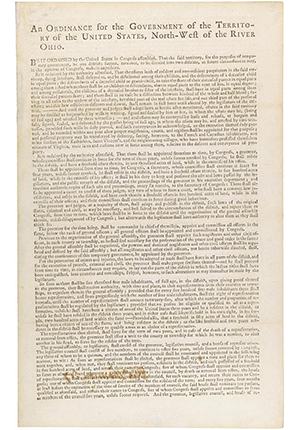Historic Document
The Northwest Ordinance (1787)
Confederation Congress | 1787

National Archives
Summary
On July 13, 1787, Congress passed the Northwest Ordinance—an act that established a framework for governing the Northwest Territory, admitting new states, and protecting the civil liberties of settlers. It also banned slavery in the new territories. However, it granted slaveholders the power to recapture enslaved people alleged to have escaped into them. When crafting the Northwest Ordinance, Congress drew, in part, on the work of Thomas Jefferson from his time in Congress. The Northwest Territory covered a massive tract of land that would eventually become the states of Illinois, Indiana, Michigan, Ohio, Wisconsin, and a section of Minnesota. Following the Civil War, Reconstruction Republicans drew on the Northwest Ordinance’s text to craft the Thirteenth Amendment, which abolished slavery.
Selected by

The National Constitution Center
Document Excerpt
Sec. 14. It is hereby ordained and declared by the authority aforesaid, That the following articles shall be considered as articles of compact between the original States and the people and States in the said territory and forever remain unalterable, unless by common consent, to wit:
Art. 1. No person, demeaning himself in a peaceable and orderly manner, shall ever be molested on account of his mode of worship or religious sentiments, in the said territory.
Art. 2. The inhabitants of the said territory shall always be entitled to the benefits of the writ of habeas corpus, and of the trial by jury; of a proportionate representation of the people in the legislature; and of judicial proceedings according to the course of the common law. . . . All fines shall be moderate; and no cruel or unusual punishments shall be inflicted. No man shall be deprived of his liberty or property, but by the judgment of his peers or the law of the land; and, should the public exigencies make it necessary, for the common preservation, to take any person’s property, or to demand his particular services, full compensation shall be made for the same. And, in the just preservation of rights and property, it is understood and declared, that no law ought ever to be made, or have force in the said territory, that shall, in any manner whatever, interfere with or affect private contracts or engagements, bona fide, and without fraud, previously formed. . . .
[I]f Congress shall hereafter find it expedient, they shall have authority to form one or two States in that part of the said territory which lies north of an east and west line drawn through the southerly bend or extreme of Lake Michigan. And, whenever any of the said States shall have sixty thousand free inhabitants therein, such State shall be admitted, by its delegates, into the Congress of the United States, on an equal footing with the original States in all respects whatever, and shall be at liberty to form a permanent constitution and State government: Provided, the constitution and government so to be formed, shall be republican, and in conformity to the principles contained in these articles; and, so far as it can be consistent with the general interest of the confederacy, such admission shall be allowed at an earlier period, and when there may be a less number of free inhabitants in the State than sixty thousand. . . .
Art. 6. There shall be neither slavery nor involuntary servitude in the said territory, otherwise than in the punishment of crimes whereof the party shall have been duly convicted: Provided, always, That any person escaping into the same, from whom labor or service is lawfully claimed in any one of the original States, such fugitive may be lawfully reclaimed and conveyed to the person claiming his or her labor or service as aforesaid.




